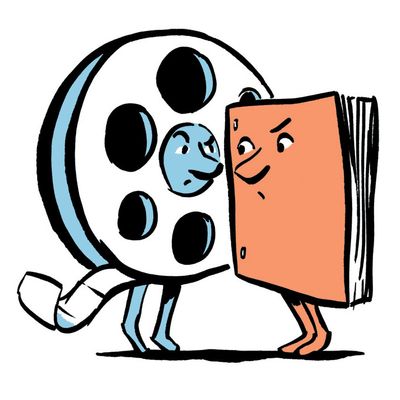
“Judging a screenplay from a finished film,” an apocalyptically disheartened screenwriter once told me, “is like arriving at a murder scene and instantly deciding that the victim had it coming.” It’s a pretty good line, although the writer will no doubt notice that I’ve mangled it a bit for my own purposes. Imagine his frustration at getting rewritten for the worse by someone who has the final say, multiply that by a thousand, and you can guess how most screenwriters feel when they see a critic airily surmise that a director “did what he could with a weak script” or watch themselves blasted for clumsy dialogue they didn’t write, a choppy structure that replaced their graceful one, or a good character turned into an inexplicable one by the vagaries of casting.
It is virtually impossible for a critic or an audience member to see a film based on an original screenplay and conclude that a good script was ruined by bad direction. Nobody ever goes there; nobody ever will. We simply don’t have enough evidence to go on, and besides, one of the salient features of bad direction is that it makes everything look worse, including the source material.
If directors are always heroes and writers are always hacks, how is it possible to figure out if a script is good? For adapted screenplays, it’s temptingly easy to compare what we see onscreen to the source material, but that’s usually beside the point; we rarely know who did what to that source material, or why. And for original screenplays, even members of the Academy’s writing branch, who pick the nominations, essentially punt on the question by demonstrating a strong bias toward scripts written or co-written by their directors — in the last ten years, those movies have snagged 72 percent of the Oscar nominations for Best Original Screenplay. (Incidentally, members of the branch are sent actual scripts for consideration, but almost all of them are “post-conformed” — in other words, retroactively tailored to represent the finished movie rather than to show voters what was originally written.)
Some writers manage to make their mark as independent artists without ever (or almost ever) directing. Writing can jump out at you for what David Fincher, talking about Aaron Sorkin’s script for The Social Network, called the “absolute total tonnage of words,” or for the consistent signature ingenuity of, say, Charlie Kaufman, whose idiosyncrasies are manifest whether Spike Jonze, Michel Gondry, or he himself is behind the camera. But great screenwriting can have many quieter virtues. Rigor of construction, economy of character development, an ear for naturalistic dialogue, a sense of graceful scene structure, an infallible feel for pacing are all merits that, at their best, render themselves invisible, which is to say, they feel like the film’s accomplishment rather than the writer’s. That’s how it’s supposed to work; that’s the job. Good writing splashes credit everywhere around it, including on the director.
But by and large, writing remains the most disrespected of filmmaking contributions, a bitter joke that has for decades made its way into movies themselves — usually black comedies about Hollywood in which the screenwriter is either a preening artiste who doesn’t understand the studio’s needs or a plaintive doormat, a human punch line. Either of those clichés, however, would be preferable to the way the makers of big-studio franchise movies increasingly treat writers, which is, professionally speaking, only as partial people. I often hear execs admiringly describe writers as “specialists”: This one can give you a page-one dialogue polish in a week, that one can “bring the heart,” this one is a carpenter who can hammer the framework of a plot into place, that one can “add depth.”
Being perceived as very good at one thing is getting a lot of writers work — there were six on Spider-Man: Homecoming, and those were just the ones who got credit for the miraculously pretty-coherent result. But you can stare at that title card for eternity and you’ll never know who contributed what. And the migration of the writers-room model from TV to movies (it was recently tried on Transformers) tends to reinforce the idea of writing as a necessary evil rather than as an artistic skill to be trusted and valued. If you view screenwriting merely as a combination of ingredients that you can outsource to different suppliers, well, then you get what you pay for — a film that seems impersonal because no writer truly got to own it before production, and a screenplay that is only understood in terms of its state of disrepair. (“Can you fix this?” is an invitation extended to writers far more often than “Can you do this?”)
Scripts shouldn’t be carved in granite — they’re blueprints, as most writers will readily admit, and revision at every stage, including production, can be invaluable. But few screenwriters are even granted the privilege of sticking with a project from inception through shooting to do that necessary work as it’s needed. And that’s just the systemic issue; mix in ego, and things get even worse. It’s worth considering that a screenplay you admire may have been the work of writers whose names you will never know. Writers are still routinely asked to sign agreements that they won’t seek to arbitrate for credit, a hideous practice that any studio that’s a signatory of the Writers Guild of America is supposed to eschew … but it happens. One well-known director routinely tries to game WGA credit arbitrations in order to gain co-writing credit; another tries to strong-arm writers into forgoing their own credit with late-night phone calls about the importance of being a “team player.” To talk to any writer who has worked in Hollywood for more than five years is to wonder why they don’t all write horror stories; they’ve certainly lived them.
So what’s the fairest way to judge the value and quality of a screenplay as you watch a movie? A few things to keep in mind:
1) Consider the track record. If the dialogue or storytelling in a movie is landing with a thud, ask yourself whether that’s an ongoing issue in the director’s work.
2) Consider everything around the script. Bad acting (or bad direction of actors) can make dialogue sound heavy or a sharp joke feel obvious. Inept cutting can make a script sound patched together. Bad scoring can make solid writing feel melodramatic.
3) Consider the voice. A good screenplay feels like it comes from one sensibility — tonally, structurally, aesthetically. That doesn’t mean it has to have come from a sole writer — the Pixar movies usually don’t, and there are plenty of writing partnerships that yield fruitful results — but it does mean that you should feel you’re being told a story, not just having a succession of scenes as conceived by a hive mind thrown at you in rapid succession.
4) Consider the mystery. So much has to go right for a movie to be great; so little has to go wrong for it to be bad. In most cases, you’ll just never know.
*A version of this article appears in the October 2, 2017, issue of New York Magazine.


